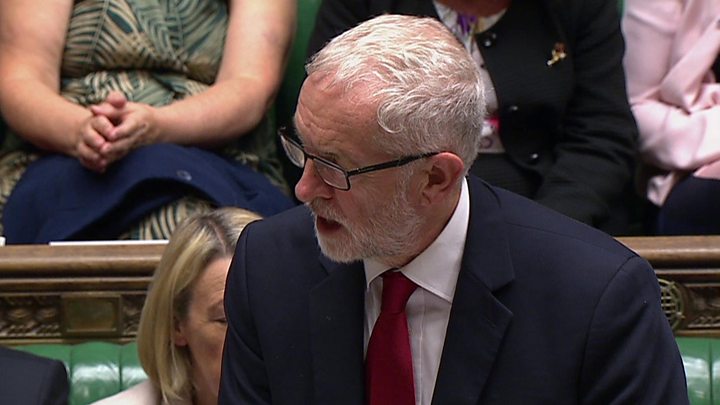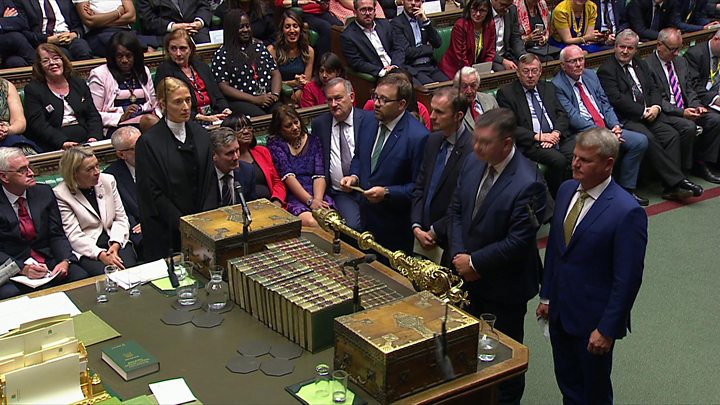Brexit: PM in new battle after Commons vote defeat
Boris Johnson faces a new battle in the Commons after his first vote as PM saw him lose to rebel Tories and opposition MPs who object to a no-deal Brexit.
The Commons voted 328 to 301 to take control of the agenda, allowing them to bring a bill requesting a Brexit delay.
The PM said he would call for a general election if he was forced to request an extension to the 31 October deadline.
MPs will now vote on the Brexit delay bill. If it passes, the vote on whether to hold an election will follow.
Wednesday in the Commons will also see Chancellor Sajid Javid outline the government's spending plans, with the health service, education and the police expected to fare well.
Speaking late on Tuesday to a packed House of Commons, the prime minister said the MPs' bill would "hand control" of Brexit negotiations to the EU and bring "more dither, more delay, more confusion".
He told MPs he had no choice but to press ahead with efforts to call an October election, adding: "The people of this country will have to choose."
Jeremy Corbyn said the bill needed to be passed to take the no-deal option completely "off the table" before his party would support the call for a general election.

Under the Fixed Term Parliaments Act, a prime minister must have the backing of at least two-thirds of MPs before a general election can be called outside of the fixed five-year terms.
Downing Street said the 21 Tory MPs who rebelled in Tuesday's vote would have the whip removed, effectively expelling them from the parliamentary party and meaning they could not stand as Conservative candidates in the election.
The rebels include several senior Conservatives including ex-chancellor Ken Clarke - a Commons veteran of nearly five decades - who said he did not recognise his party anymore.
"It's the Brexit Party, rebadged," he told BBC Two's Newsnight programme.
The "knockabout character" of the prime minister had "the most right-wing cabinet a Conservative government has ever produced", he said.
Also among the other jettisoned rebels are Philip Hammond who - until 24 July - served as chancellor, former justice secretary David Gauke, Winston Churchill's grandson Sir Nicholas Soames, and Rory Stewart, who recently stood against Boris Johnson to be the party leader.
Sir Nicholas said he would end his parliamentary career if a snap general election was held.
He said his decision to rebel was not taken "lightly", but he felt strongly about avoiding a no deal.
He added: "The fact is I'm satisfied that [the prime minister] himself wants a deal, but the deal he wants is not available."
Hours before the vote on Tuesday, the government had already lost its working majority when Tory MP Phillip Lee defected to the Liberal Democrats.

Could the Commons defeat be a benefit to PM?
It's hard to know where to start sometimes.
The pace and gravity of events in Westminster this week is both monumental and dizzying.
A prime minister has lost his wafer of a majority.
But some close to the prime minister believe that from this crisis comes an opportunity - to close the unfinished business of the referendum result in 2016, with the Tory party at last being the bearers of a crystal-clear message on Brexit.
It's a measure of how upside down the political norms are - that the prime minister losing his first vote in office is considered by some of his allies as a benefit.
What's happening on Wednesday?
- Mr Johnson's first prime minister's questions at 12:00 BST
- Chancellor Sajid Javid revealing the government's spending plans for 2020/21 from 13:00 BST
- Later, a vote on the Brexit delay bill brought by opposition and rebel MPs
- If the bill passes, a possible vote on whether to hold an early general election
Meanwhile in Scotland, a judge is due to announce his decision on Wednesday morning on whether the prime minister's planned suspension of Parliament is legal.